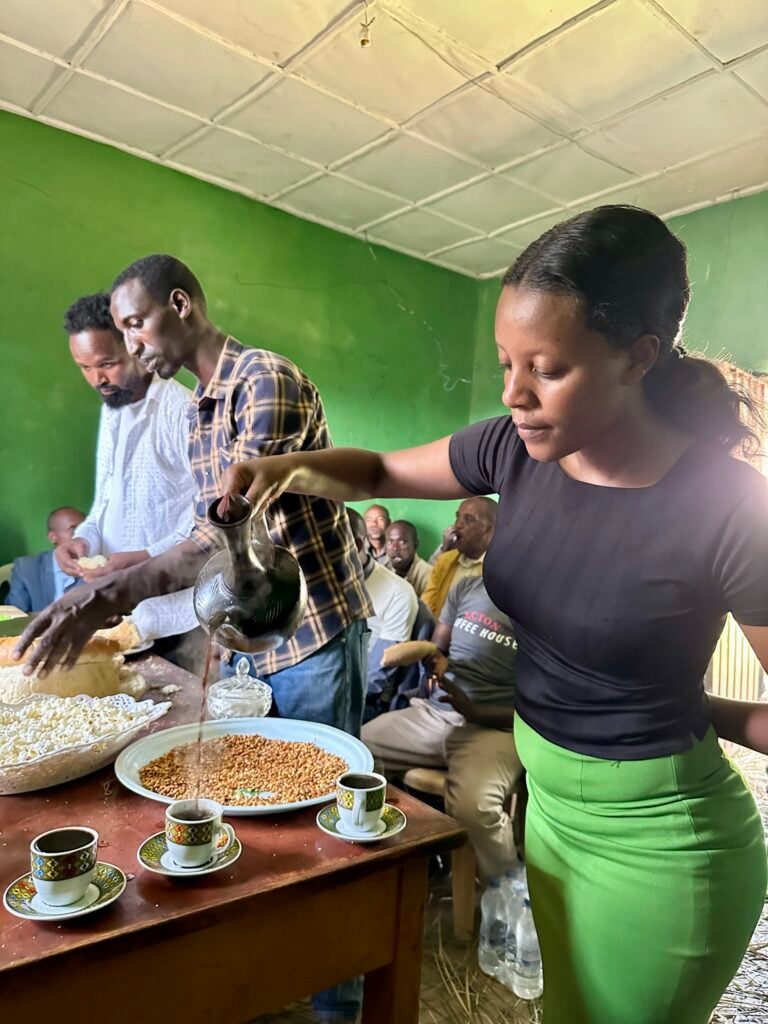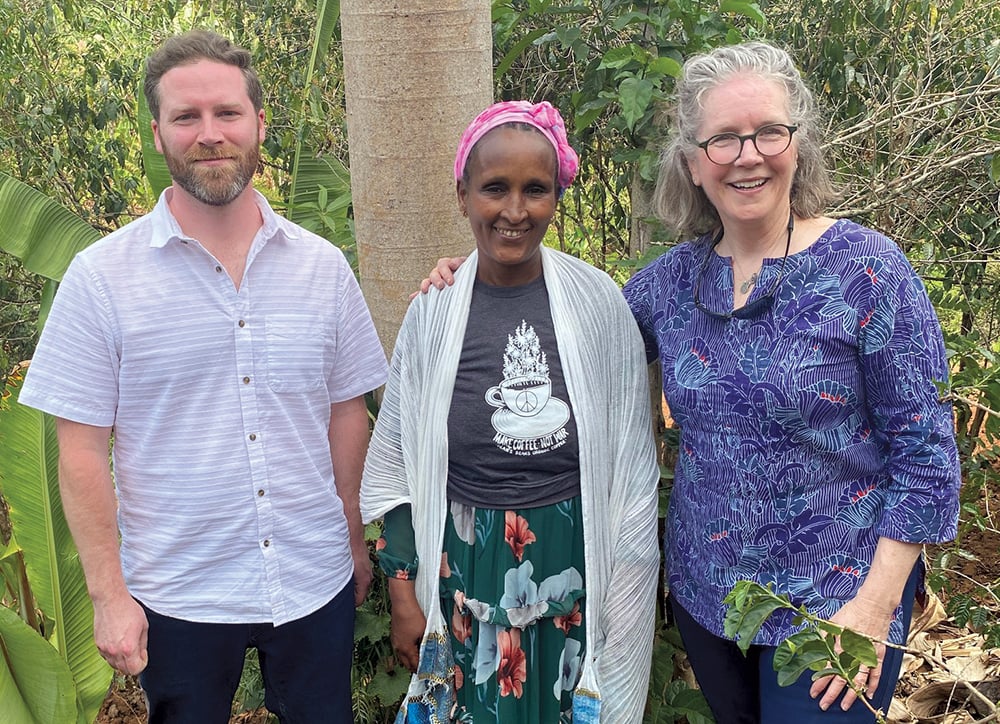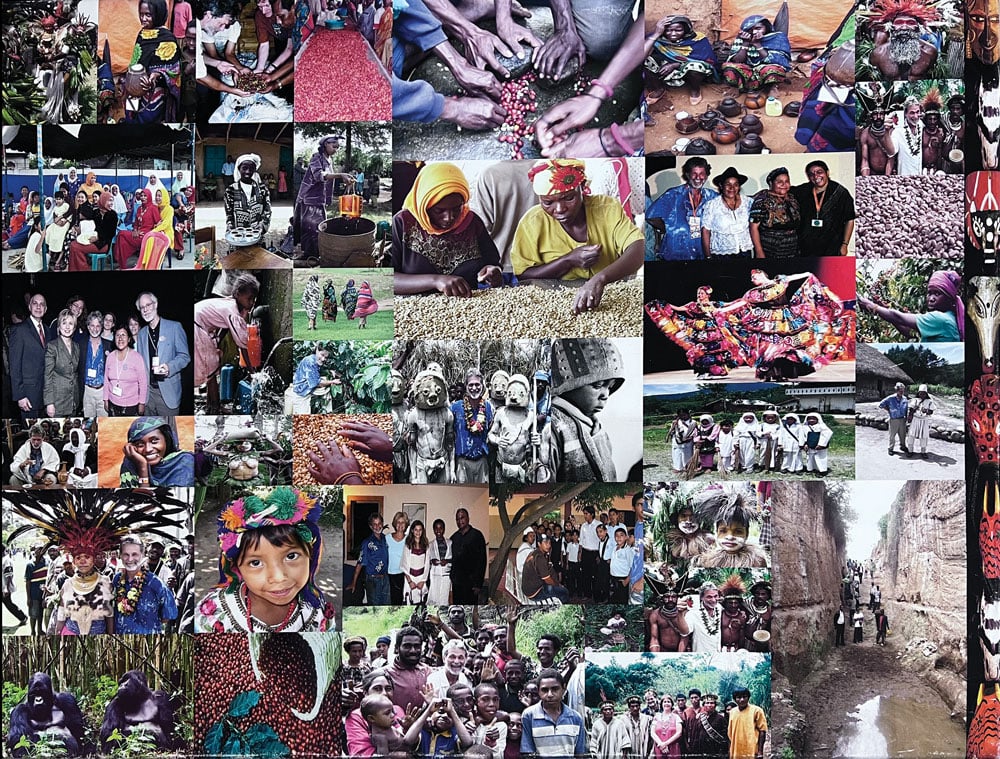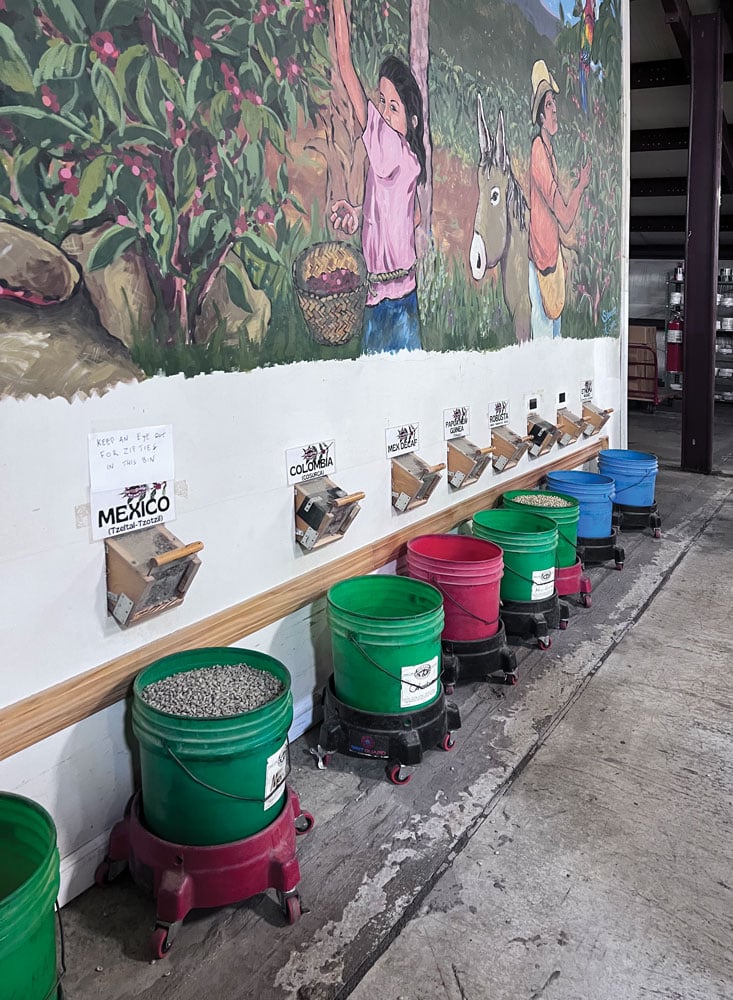Dean’s Beans Organic Coffee: Indigenous Activism in Every Cup

Coffee is truly a global connector. Almost the entire population of planet Earth could be divided into two groups: coffee consumers and coffee suppliers. These days there’s more gray area than there used to be–Beth Spong, CEO of Dean’s Beans Organic Coffee, told me that in Indonesia, where a lot of coffee is grown, there’s a burgeoning coffee drinking market. In Ethiopia, which is where all coffee plants and practices originate from, there is a deep culture around it. Brendan, who has worked at Dean’s for 18 years and is now the Roastmaster and Green Coffee Buyer, said his visits there always include coffee ceremonies with his hosts: the beans are roasted in the home, ground fresh, and brewed to be enjoyed with guests as part of a ritual that goes back hundreds of years.

But otherwise, by and large, coffee drinkers and coffee farmers are very disconnected. Specialty coffee (defined as any coffee that has achieved a score of 80 or higher out of 100 on a standardized score sheet by expert coffee tasters) makes up about 10% of the global coffee market. Only 3% of coffees are certified organic. Specialty coffee which is both organic and fair trade makes up a tiny sliver of the market, and even within that small number, very few roasters have the skill, resources, or interest to form relationships with the people who grow the beans. Dean’s Beans is an outlier in this way. Time and again, on their trips to visit their coffee farmer cooperative partners along the equator in the coffeelands, Dean’s Beans employees hear that other buyers who visit rarely go beyond the bare minimum for business. In contrast, Beth, Brendan, and other visiting Dean’s staff engage with their partners to learn about what’s working, where they’re struggling, and what improvements can be made.
Most coffee farmers are poor, have problems getting fresh water in their communities, and deal with issues related to deforestation. Each coffee cooperative has unique issues, as well. Sometimes they need help with irrigation systems, sometimes with improving greenhouses. Dean’s has helped set up intercropping systems so that the farmers and their families can grow food for themselves and to sell at local markets. Whatever those issues are, Dean’s tries to help. They also pay above market value for the coffee.

Dean’s Beans Organic Coffee was founded in 1993 by an environmental and indigenous rights lawyer named Dean Cycon. The motivation to create the business was to directly support coffee-growing communities, many of which are indigenous, and to show the world that a truly beneficial business model could work. And for the last thirty years, that is exactly what they’ve done.
The Beans
But what about the coffee? Well, it’s really, really good. Their roastery in Orange, MA, is equipped with two ecologically friendly, state-of-the-art American-made machines that roast the beans to order. When Pete puts in orders for our Bulk department, they are roasted and packaged the same morning they’re delivered. The Dean’s Beans staff is super knowledgeable and committed to quality. As worker-owners of a mission-driven cooperative, they’re motivated to care about the products they’re producing–the job is not just a paycheck. They’ve been working as high-end coffee roasters for decades, perfecting their processes and the quality of their roasts. For many people, the world of specialty coffee is a relatively recent interest. But Dean’s Beans has been at this for a long time, and should not be overlooked simply because it isn’t the fancy new kid on the block. Their beans are second-to-none: fresh, roasted to perfection, always organic, and always fair trade. There’s a lot of care in every cup. As Dean says in one of their videos, “You can’t taste any slavery or environmental destruction in there.” They’ve also started a line called Sweet Justice that applies all the same principles of compassion and excellence to cocoa and other yummy treats–the Co-op carries packages of their chocolate-covered coffee beans in Bulk.
At Dean’s Beans’ headquarters, the production floor is remarkably clean and free of clutter, and artwork adorns the walls everywhere you go. Upon entering the office area, hand-made wooden masks from the coffeelands hang next to a large photo collage made up of pictures from Dean’s travels. He’s been around the world as both a businessman and activist, advocating for the rights and safety of their indigenous farmer partners. Most of the people who grow coffee still speak the language and engage in the customs of their traditional communities. Beth told me that on her visits to farms the people she meets sometimes don’t speak the official language of the country they’re in. For instance, in parts of Nicaragua the people growing the beans don’t speak Spanish, they speak their native indigenous language. The photos in the collage depict a wide range of cultures and experiences around the world, from podiums and political speeches to elaborate headdresses, boldly painted faces, and loincloths. Coffee truly connects a global village.

The largest artwork is part of the “bean wall,” where a giant mural depicting the lush greenery of a coffee farm is the face of what is basically a super large version of the gravity bins we have here at the BFC in the Bulk department. Spouts that pour the coffee beans have been installed low on the front of the mural, each with a label. And on the reverse side of the wall are huge hoppers made of food-grade particle board that are filled with green coffee beans; each hopper can fit one and a half tons. Every morning the orders that have come in are collated and totaled, and the exact amount of each type of bean is weighed and roasted. Some are blends that are roasted together, some are roasted and then blended, and some are single origin.

Why Nitro
Last year Dean’s introduced a canned nitro cold brew coffee they call Nice Nitro. It’s remarkably delicious. Anyone who drinks bottled cold brew will be impressed: it stands alone as the best tasting canned or bottled coffee, hands down. There’s no funky or bitter aftertaste–it’s just smooth and creamy from top to bottom, and it doesn’t even have any sweetener or milk. How’d they do it? Brendan and the whole team at Dean’s did extensive research and taste-testing with different blends of beans and amounts of nitrogen, and ended up with a complex blend of beans. Their Colombian beans make up over half, Nicaragua and Honduran make up most of the remainder, and a splash of their Sumatran French roast tops it off. The addition of nitrogen adds a few desirable qualities: it creates a creamy mouth-feel, takes more of the bitterness away, and makes a beautiful, satisfying cascade of microfoam when poured into a glass, much like a pint of Guinness would do fresh out of the tap at an Irish pub. (For those of you who are confused about why nitrogen gas would ever be combined with a beverage, just think about how carbonation affects water: it adds texture and taste. Nitro works on the same level of sensory qualities.)
A key difference that sets Dean’s Nice Nitro apart from other canned coffees is that it’s kept consistently cold. They found that warm temperatures were the number one flavor killer, so in order to maintain the quality of Nice Nitro they’re committed to keeping the product at the proper temperature 100% of the time. That means transportation and storage must be carefully handled, and their Nitro cans are only available regionally. In fact, our store is the only market outside Massachusetts that carries this special drink. We’re lucky to have it. Buy one, shake it up, and pour it into a glass for an amazingly smooth and delicious treat. The attention to detail and commitment to quality will be sumptuously evident.
Becoming a Worker-Owned Co-op
Dean Cycon had been looking for a way to retire for a number of years, but for a founder looking to make a change while maintaining the ethical standards of the business and the support of their employees, that’s easier said than done. In fact, only about a fifth of businesses that go up for sale stay intact; the majority are dismantled and sold for parts. Beth, who was originally brought on as a consultant before Dean’s retirement, was brought on as COO to help guide the process of researching their options. Ultimately it was decided that the worker-owned co-op model provided the best path forward, and Beth transitioned into the role as CEO after the transition.
The process took fifteen months, and was led by a steering committee consisting of five staff members plus Beth. They had a lot of support from some wonderful organizations that help cooperatives, like the Cooperative Fund of New England (CFNE) and the Cooperative Development Institute. All the staff members at the time were invited to become owners, and all decided to join, which is a great point of pride for Beth–they’re now owned by fifteen employee-owners, many of whom have been on staff for a decade or more.
As with every co-op, including ours, each owner has one share. There’s a board of directors consisting of five employees plus Dean, and they work with Beth to guide the direction of the business, much like our board does with Anthony. Dean officially retired and stepped down as CEO on June 30, 2023.
Conscience, Logic, and Longevity
Beth explained that organic certification is about the health and wellbeing of both the natural environment and the coffee growing communities, and fair trade certifications are about economic and educational opportunities for farmers and their families, representation in decision-making processes, gender equity and the prevention of child labor. Say what you will about these certifications (and yes, there is a lot to say), you are far more likely to get a product that is not harmful if the product has those certifications. Dean’s Beans has opinions about which certifying organizations are more aligned with their values, and sticks closely to the farmers they know, so in their case it’s a no-brainer: fair trade and organic really means people are being treated fairly. But even less scrupulous businesses that have these trademarks are worth choosing over ones that don’t. As Beth said, “Outcomes for people who work at fair trade certified businesses are better. That’s just a fact.”
The coffee plant is extremely valuable, and it’s also vulnerable. The changing climate is threatening its survival. It seems logical that to protect it we should listen to the people who are working with these crops year in and year out. Dean’s Beans is modeling the best path forward for our coffee-drinking future by centering the voices and needs of their farmer partners, and investing in sustainable practices like solar power, compostable packaging, funding conservation projects, and more. The large companies that produce the fast-food version of coffee are doing what they do: leveraging short-term goals to fulfill their responsibilities to fiscally eager shareholders. Dean’s Beans is showing us what’s possible, and providing delicious, satisfying coffee in the process.
In Beth’s office, there’s a little framed artwork with a quote from Alice Walker: “Activism is my rent for living on the planet.” It’s remarkable that Dean’s Beans has consistently, perhaps even stubbornly, been paying that rent for all these years. Tyler, another worker-owner, was only hired in 2021, but he’s been drinking Dean’s Beans coffee since he was a little kid growing up in Western Mass. To think that the relationships this relatively small business has cultivated in our community over the last three decades are mirrored in equatorial jungles thousands of miles away is remarkable. Dean’s Beans is bringing us all a little closer together.
Dean’s Beans Tasting! Friday, May 17, 11:30 am–2:30 pm.
By Ruth Garbus
About Producer of The Month

Shop Online

On Sale Now!

